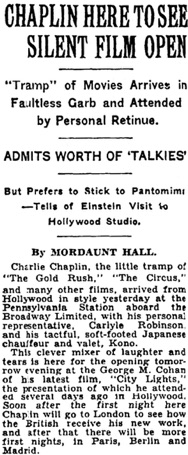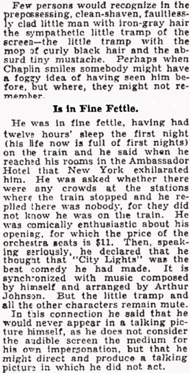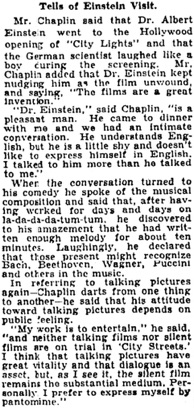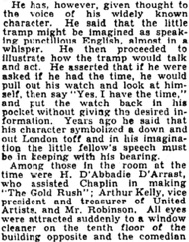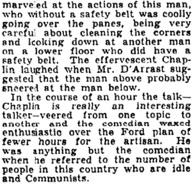City Lights 1930 1931 1932 next previous
City Lights Clippings 189/387
Mordaunt Hall, New York Times, N. Y., February 4, 1931
„I prefer to express myself in pantomime“
Editorial content. „CHAPLIN HERE TO SEE
SILENT FILM OPEN
,Tramp‘ of Movies Arrives in Faultless Garb
and Attended by Personal Retinue.
AMITS WORTH OF ,TALKIES‘
But Prefers to Stick to Pantomime
– Tells of Einstein Visit to
Hollywood Studio.
By MORDAUNT HALL.
Charlie Chaplin, the little tram of The Gold Rush, The
Circus, and many other films, arrived from Hollywood
in style yesterday at the Pennsylvania Station aboard the
Broadway Limited, with his personal representative,
Carlyle Robinson, and his tactful, soft-footed Japanese
chauffeur and valet, Kono.
The clever mixer of laughter and tears is here for the
opening tomorrow evening at the George M. Cohan
of his latest film, City Lights, the presentation of which
he attended several days ago in Hollywood. Soon
after the first night here Chaplin will go to London to see how
the British receive his new work, and after that there will
be more first nights, in Paris, Berlin and Madrid.
Few persons would recognize in the prepossessing,
clean-shaven, faultlessly clad little man with iron-gray hair the
sympathetic little tramp with the mop of curly black
hair and the absurd tiny mustache. Perhaps when Chaplin
smiles somebody might have a foggy idea of having
seem him before, but where, they might not remember.
Is In Fine Fettle.
He was in fine fettle, having had twelve hours‘ sleep the
first night (his life now is full of first nights) on the train
and he said when he reached his rooms in the Ambassador
Hotel that New York exhilarated him. He was asked
whether there were any crowds at the stations where the train
stopped and he replied there was nobody, for they did
not know he was on the train. He was comically enthusiastic
about his opening, for which the price of the orchestra
seats is $11. Then, speaking seriously, he declared that he
thought that City Lights was the best comedy he had
made. It is synchronized with music composed by himself
and arranged by Arthur Johnson. But the little tramp
and all the other characters remain mute.
In this connection he said that he would never appear
in a talking picture himself, as he does not consider
the audible screen the medium for his own impersonation,
but that he might direct and produce a talking picture
in which he did not act.
He has, however, given thought to the voice of his
widely known character. He said that the little tramp
might be imagined as speaking punctilious English, almost
in a whisper. He then proceeded to illustrate how
the tramp would talk and act. He asserted that if he were
asked if he had the time, he would pull out his watch
and look at himself, then say ,Yes, I have the time,‘ and put
the watch back in his pocket without giving the
desired information. Years ago he said that his character
symbolized a down and out London toff and in his
imagination the little fellow‘s speech must be in keeping
with his bearing.
Among those in the room at the time were H. D‘Abbadie
D‘Arrast, who assisted Chaplin in making The Gold
Rush: Arthur Kelly, vice president and treasurer of United
Artists, and Mr. Robinson. All eyes were attracted
suddenly to a window cleaner on the tenth floor of the building
opposite and the comedian marveled at the actions
of this man, who without a safety belt was coolly going over
the panes, being very carefully about cleaning the
corners and looking down at another man on a lower floor
who did have a safety belt. The effervescent Chaplin
laughed when Mr. D‘Arrast suggested that the man above
probably sneered at the man below.
In the course of an hour the talk –Chaplin is really
an interesting talker – veered from one topic to another and the
comedian waxed enthusiasm over the Ford plan of fewer
hours for the artisan. He was anything but the comedian when
he referred to the number of people in this country who
are idle and Communists.
Tells of Einstein Visit.
Mr. Chaplin said that Dr. Albert Einstein went to the
Hollywood opening of City Lights and that the German scientist
laughed like a boy during the screening. Mr. Chaplin
added that Dr. Einstein kept nudging him as the film unwound,
and saying, ,The films are a great invention.‘
,Dr. Einstein,‘ said Chaplin, ,is a pleasant man. He came
to dinner with me and we had an intimate conversation.
He understands English, but he is a little shy and doesn‘t like
to express himself in English. I talked to him more than
he talked to me.‘
When the conversation turned to his comedy he spoke
of the musical composition and said that, after
having worked for days and days on la-da-da-da-tum-tum,
he discovered to his amazement that he had written
enough melody for about ten minutes. Laughingly, he declared
that those present might recognize Bach, Beethoven,
Wagner, Puccini and others in the music.
In referring to talking pictures again – Chaplin darts
from one thing to another – he said that his attitude toward
talking pictures depends on public feeling.
,My work is to entertain,‘ he said, ,and neither talking films
nor silent films are on trial in City Streets.‘ I think that
talking pictures have great vitality and that dialogue is an asset,
but, as I see it, the silent film remains the substantial
medium. Personally, I prefer to express myself by pantomime.“
City Streets is a film directed by Rouben Mamoulian.
The title of Charles Chaplin‘s film is City Lights.
The world premiere of City Lights takes place in Los Angeles
January 30, 1931 at the Los Angeles Theatre.
Los Angeles Theatre, 615 South Broadway (between
6th and 7th Streets), Los Angeles.
City Lights opens in New York February 6, 1931
at the Cohan Theatre.
George M. Cohan Theatre, 1482 Broadway (between
42nd and 43rd Streets), New York.
Redaktioneller Inhalt
City Lights 1930 1931 1932 next previous

